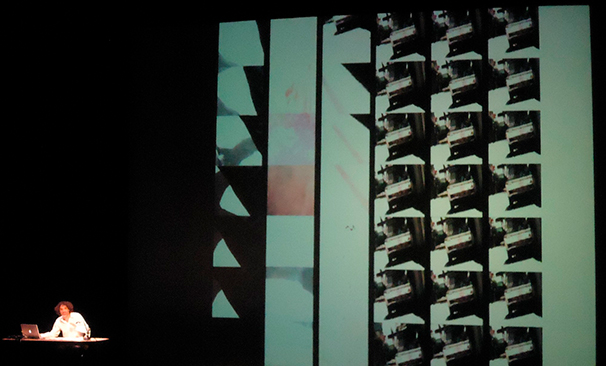What are you looking for?
You might be looking for...
Activar los poderes de otro cuerpo
Activity open to everyone and free of charge with limited capacity

In the framework of the exhibition Holey, the cycle Activar los poderes de otro cuerpo (Activating the Powers of Another Body) invites you to collectively "go through" this itinerary that contains projections, listening, performances and meditations. If the first part of this cycle developed in June focused on sight and relearning to look, this second part explores the possibilities of sound, listening and voice to create images and shape reality.
The programme is structured in three parts, will start at 11:00 and will last approximately 2 hours.
16.09.23 / 11:00 – 13:00 / Activar los poderes de otro cuerpo II:
The Tuning Meditation, by author Pauline Oliveros guided live by sound artist and researcher Ximena Alarcón.
The Tuning Meditation (2007) invites the audience to tune in by sounding with the voice, using vocals and/or humming, and to listen together regardless of their artistic experience or common language. At the beginning of this meditation, clouds of sounds are heard. Eventually these are transformed into harmony with common tones moving through the sound field, as the intonation happens on sonic and metaphoric levels.
Session of audiovisual pieces:
- The Black Sections (2020). C.W. Winter
- Apparition (2019) by Ismael Bahri
- Irani Bag (2021) by Maryam Tafakory
- This Lemon Tastes of Apple (2011) by Hiwa K
- Antelopes (2020) by Maxime Martinot
The Pixelated Revolution. Rabih Mroué's performative lecture
Rabih Mroué is a Lebanese director, playwright, performer, essayist and visual artist, whose work always reflects on the uses of images in (and against) official narratives: from the geopolitical reality of Lebanon to the mass production of images in the Syrian revolution.
The Pixelated Revolution is a lecture-performance on the use of mobile phones during the Syrian revolution. In it, Rabih Mroué analyses the role of images and their centrality in mobilising people during the revolutionary events, due to the very nature of these captured images, their reproducibility and their easy circulation.
Born in Beirut, Rabih Mroué is a theatre director, actor, scriptwriter and visual artist. His recent work includes video and installation art. He has been a participant in The International Research Center: Interweaving Performances Cultures/FU/Berlin. He is co-founder of the Beirut Art Center (BAC) and his work has been exhibited at the CA2M Centro de Arte Dos de Mayo, the MoMA, or the Centre Pompidou.
Previous sessions:
10-11.06.2023 / Activar los poderes de otro cuerpo I
Transformar en visible lo invisible. Screening of Parsi, by Eduardo Williams, and talk with the filmmaker
Masajes de la visión / Idoia Zabaleta and Leticia Morales
Cycle curated by Garbiñe Ortega, in collaboration with the students of the Elías Querejeta Zine Eskola (Paul Bonnarme, Pol Crosas, Lucía Dellacha, Sara Domínguez López, Alejo Duclós, Lorena García and Deva Pereda), in the framework of the exhibition Holey.
Eduardo Williams (Argentina, 1987) studied at the Universidad del Cine in Buenos Aires, before joining Le Fresnoy - Studio national des arts contemporains in France. His short films Pude ver un puma (2011) and Que je tombe tout le temps? (2013) premiered at Cinéfondation and Director's Fortnight at the Cannes Film Festival followed by Tôi quên rồi! (2014). Retrospectives of his short films are organised, among other places, at the Cinémathèque Française in Paris and the Film Society of Lincoln Center in New York. His first feature film, El Auge del Humano (2016), won the Filmmakers of the Present Award at the 69th Locarno Film Festival.
Idoia Zabaleta is an outstanding creator of the current contemporary scene. As a performer, she has collaborated in several productions by the company Mal Pelo. She has a degree in biology, and her specialisation in ecosystems and population dynamics can be seen in the ideas that run through her works: tensions and interrelationships between performers, creators, with the audience, with the performance space, the limits of the territory, etc. A teacher and manager, in 2008 she created, together with Juan González, the creative space AZALA as a space for research, promotion and dissemination of stage creation.
Pauline Oliveros (1932-2016) founded the practice of Deep Listening. As a composer, performer and humanitarian she was grounded in opening her own and others' sensibilities to the universe of sounds. In the 1960s she had a profound influence on American music through her work with improvisation, meditation, electronic music, myth and ritual. He founded the practice of Deep Listening®, which he described as a way of listening to everything it is possible to hear, no matter what one is doing. Such deep listening includes the sounds of everyday life, nature, thoughts and musical sounds. Interested in communication between all forms of life, she paid particular attention to the "healing power of sonic energy and its transmission within groups".
Rabih Mroué was born in 1967 in Beirut (Lebanon), where he lives and works. Trained in theatre at the Lebanese University of Beirut, he began producing his own plays in 1990 as a director and actor. Since then, he has written and directed performances and videos that question the place of the spectator, the social significance of the actor, the space of the audience and the form of performance. In the company of Lina Saneh, since 2002 his performances have been seen on the international art circuit and at contemporary theatre festivals, where they have received numerous awards. With a minimalist language and great formal inventiveness, Mroué presents the conflicts that have affected Lebanon and the Middle East in recent decades, and which allow him to address universal themes such as memory and the construction of identity. Mroué starts from a documentary base with archival material (newspapers, photographs, videos, etc.) and moves between reality and fiction. He is co-founder of the Beirut Art Center (BAC) and since 1995, he has been collaborating with the Lebanese channel Future TV as a scriptwriter and director of short animated films and documentaries.